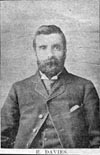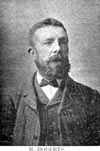Pay, Strikes and Living Conditions -
Strikes
Who were the seven?
Robert Davies of Tregarth, a well-known
Union leader and first class orator led the deputation. He was a
deacon in a local Independent Chapel. Thomas Roberts of Sling
also held a similar post in his chapel and represented the
rybelwyr on the committee. Robert Thomas of Penybryn was regarded
as a very skilled quarryman and was a member of the Salvation
Army. William Williams from Gerlan had been a
member of the deputation to the first Lord Penrhyn during the
Pennant Lloyd negotiations of 1874. He is to be seen in famous
painting of the event. He was a Methodist deacon. Another who had
worked at the quarry all his life was Robert Roberts,
Caerllwyngrydd and a Union member to the marrow of his bones. He
represented the labrwyr on the committee. Henry Jones of Gerlan
was an Anglican as was Benjamin T. Williams. He was a fitter by
trade at the quarry and represented that group. (Interestingly
enough, Henry Jones would become chairman of the committee during
the Great Strike of 1900-03, as would be William Williams.) Henry
Jones would wonder how the Vicar of Bethesda could pass his front
door during the great strike when visiting parishioners.
These were the men libelled as
Agitators by E.A. Young. The day following the
dismissals, the men refused to take their bargains and start work
until they received an explanation of Young's actions. It was
September 29th, and the following day they were locked out. This
lock out, which Young called a strike was to last until August
1897. During this time E.A. Young became the focus of great
resentment. In order to alleviate the poverty of the men, the
Daily Telegraph together with concerts and general subscriptions
collected £19,161 for the locked out men. During the lock out,
Young always made certain that spies employed by him kept a
meticulous record of not only what was said but also who said
what. These reports were meticulously scrutinised by him and
indexed for further use. Real anxiety, uncertainty and fear of
victimisation remained though. In June 1899, Robert Davies who
had chaired numerous deputations to Lord Penrhyn was dismissed.
Two months before that Young ordered that from then on union
payments were not to be collected at the quarry. The situation
was slowly but surely reaching breaking point.
 |
 |
 |
 |
 |
| R. Davies |
R. Roberts |
W. Williams |
H. Jones |
R. Thomas |
|
 |
|
 |
|
|
T. Roberts |
|
Benjamin T. Williams |
|
|